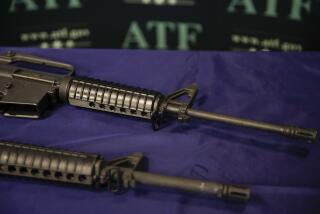Camarillo Firm Denies Illegally Exporting Phantom Jet Parts
- Share via
An attorney for the Elgie Corp. has denied U.S. Customs Service allegations that the company made unlicensed exports of spare parts for the F-4 Phantom jet, including two shipments to a London company described by customs agents as a go-between for the Iranian government.
The allegation, first revealed Sunday, was made in Los Angeles federal court by the Customs Service as grounds for a warrant to search Elgie’s plant in Camarillo.
Shipment Intercepted
Charles C. Brown, a Salt Lake City attorney representing Elgie, said “just a very small percentage” of Elgie’s production “ever went to this company in London.” He said officials at Elgie had no idea the London company was suspected of buying for Iran.
Elgie has a 27,000-square-foot plant in Camarillo and another plant in Layton, Utah.
The court papers, filed in November, contend that customs agents in Denver intercepted in October an Elgie shipment of F-4 Phantom parts valued at $17,403 and destined for London-based Aircraft Equipment International Ltd.
The Customs Service alleged that Elgie and another Utah firm made “in excess of 65 export shipments of aircraft parts, all without license, in the last two years,” to foreign countries.
Brown denied that and said most of Elgie’s parts are sold in this country.
Shipments of military hardware to Iran are illegal because of an embargo declared after the Ayatollah Ruhollah Khomeini came to power in 1979.
No charges have been filed against Elgie or any of its officials, according to Gary Hillberry, who is in charge of Customs Service investigations for the Rocky Mountain states.
Hillberry said Tuesday that he will probably send information on the Elgie investigation to the U.S. attorney’s office in Salt Lake City within 60 days and that the U.S. attorney there would then decide whether to pursue indictments in the case.
Plans Stolen
A spotlight was thrown on the company last week by a burglary reported at the Camarillo plant. The police said someone climbed through the skylight over the weekend of Dec. 29-30 and stole about 190,000 pieces of microfilmed plans for the F-4 Phantom and the A-4 Skyhawk fighter jets.
Sgt. Paul Oechsle, the Ventura County sheriff’s detective investigating the theft, said there are no suspects. The thief left no fingerprints. Both Hillberry and Oechsle said they are not aware of any link between the theft of the microfilm and the matters involved in the Custom Service’s investigation of Elgie.
Mark Williams, production manager at the Camarillo plant and the son of Elgie’s president, Fred Williams, said the thief seemed to know what to look for and where to look.
Data stored on microfilm purchased from the U.S. Department of Defense is kept in squares a little larger than postage stamps on longish, rectangular cards at the company. Williams estimated the value of the stolen cards at $60,000 and said their absence could make it hard to bid on certain contracts.
Elgie is one of several companies in Camarillo and many in the Los Angeles area in the highly competitive business of making spare parts for out-of-production, U.S.-built military planes, Williams and others say. Williams said the companies depend mostly on information stored on microfilms like those that were stolen. They contain blueprints purchased directly from the U.S. government.
Information Unclassified
The information is unclassified, Williams said. “Anybody can get it.”
As an example of what Elgie makes, Williams pointed to a desk in his father’s office. Upon it rested pieces of machinery that Williams said were used “to keep the bombs from shaking around” beneath the wings of an A-4 Skyhawk attack plane. Neither the F-4 nor the Skyhawk is still in production. Both were made by the McDonnell Douglas Corp.
Williams, 32, of Camarillo said he believes the thief may have been from a domestic competitor, but that he has no idea which one.
“It would take somebody who knows the business,” he said. “It wasn’t somebody foreign or from some terrorist country. We haven’t sold to any terrorist country.”
Williams said that, for six months ending in November, he kept the cards locked in an office. About a month ago he moved them to a bank of file cabinets in a room the size of a small closet. “The person knew where to look,” he said.
More to Read
Inside the business of entertainment
The Wide Shot brings you news, analysis and insights on everything from streaming wars to production — and what it all means for the future.
You may occasionally receive promotional content from the Los Angeles Times.










